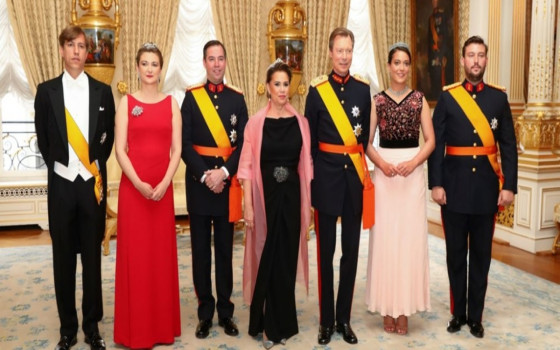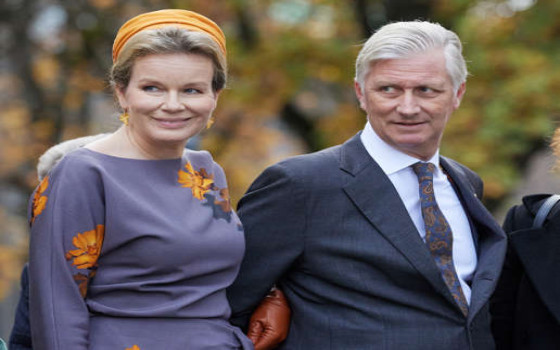Belgian King and his daughter to be guests of honor at historic event in neighboring country... Grand Duke of Luxembourg to abdicate in favor of his heir.

- Europe and Arabs
- Friday , 3 October 2025 10:32 AM GMT
Brussels –Luxembourg : Europe and the Arabs
Belgian King Philippe and his daughter, Crown Princess Elisabeth, will be guests of honor at the royal succession ceremony in Luxembourg on Friday.
Luxembourg will witness a historic moment. Grand Duke Henri, 70, will abdicate the throne after 25 years.
He will be succeeded by his son, Crown Prince Guillaume, 43. Guillaume's wife, Stephanie, 41, from the Belgian province of Hainaut, will become the new Grand Duchess.
Belgian King Philippe, 65, will be the guest of honor, visiting Luxembourg with his wife, Queen Mathilde, 52, and Crown Princess Elisabeth, 23, who has traveled from the United States specifically to attend the event.
A "Duke" is a high-ranking title of nobility, traditionally bestowed in European monarchies.
In the hierarchy of titles, a Duke usually comes immediately after a King or Prince, and is considered one of the highest ranks of nobility.
A Duke often rules over a territory called a duchy. The Grand Duke of Luxembourg is the head of state, similar to a King in Belgium or Spain.
The Grand Duchy of Luxembourg is a small but historically significant country in Western Europe, renowned for its rich history, culture, and political influence. Since its founding in the 10th century, Luxembourg has undergone numerous transformations that have shaped its development and position in Europe. Luxembourg was founded in 963 when Count Siegfried purchased a castle on a high hill, which later became known as the Luxembourg Castle. This castle was strategically located at the crossroads of trade routes, contributing to the economic development of the region and attracting new settlers. Initially, Luxembourg was a county, and its importance grew through strategic marriages and political alliances. In the 12th century, Luxembourg became a significant center of power and culture when Henry VI, the first count, married a woman from a powerful dynasty, thus expanding the territory of the county. In 1354, Luxembourg was elevated to a duchy by Emperor Charles IV, which further strengthened its position on the international stage. This status increased Luxembourg's influence in Europe and improved its political and economic standing. The Duchy of Luxembourg faced numerous external threats and conflicts. It was often a battleground between major powers such as France, Germany, and the Netherlands. Wars of succession, dynastic disputes, and conflicts between local feudal lords led to economic difficulties and political instability. Luxembourg became a cultural melting pot, where different traditions and influences intertwined. From its founding, it developed as a multi-ethnic and multicultural state. Medieval Luxembourg architecture features numerous castles, churches, and public buildings. Among them, the Vianden Castle stands out as a symbol of the duchy and an important defensive structure. Architectural styles ranged from Romanesque to Gothic, reflecting the region's cultural diversity. Language and literature played a significant role in the culture. The Luxembourgish language, which emerged during this period, became a symbol of national identity. Literature and poetry flourished in several languages, including Latin, French, and German, reflecting the region's cultural diversity. The medieval economy of Luxembourg was based on agriculture, crafts, and trade. Its location at the crossroads of important trade routes contributed to the prosperity of the local economy. Trade with neighboring regions led to the development of towns like Luxembourg City, which became an important commercial center. Luxembourgish goods, including textiles and metal products, were in high demand in neighboring countries. Agriculture remained the main source of income for most of the population. Fertile land allowed for the cultivation of a variety of crops, such as wheat, barley, and grapes. The wine industry became an important part of the region's culture and economy. The Benelux Union was established in 1944 between the three Western European kingdoms: Belgium, the Netherlands, and Luxembourg. The agreement was signed by the three kingdoms in exile in London in 1944. It came into effect in 1947 and continued until 1960 when it transformed into the Benelux Economic Union. The name is derived from the first letters of the three countries and refers to a political-economic union and intergovernmental cooperation between these three neighboring Western European nations. The name was first used for the customs agreement that formed the union, and today, the term Benelux refers to the geographical, economic, and cultural entity of the three countries.














No Comments Found